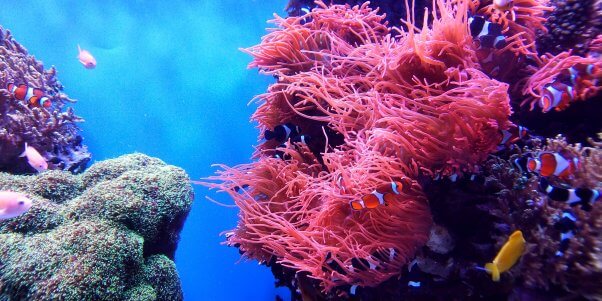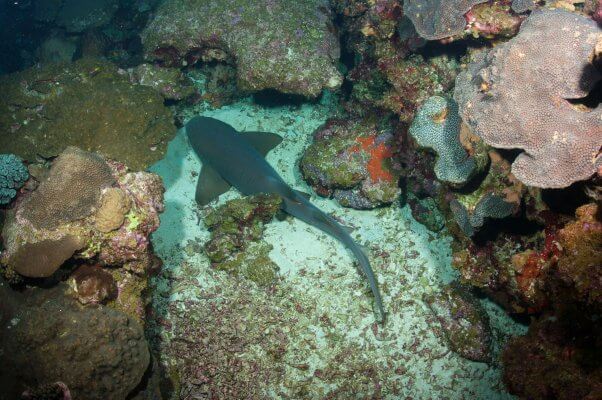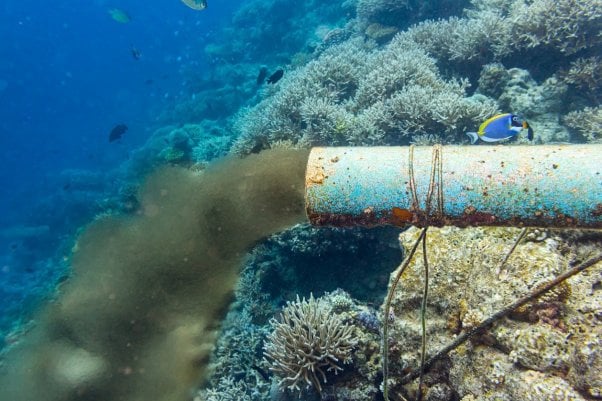Beneath the ocean’s shimmering surface lies a world of mystery seemingly unscathed by time. But just like the ozone and the rainforests, the oceans bear deep wounds from human activity. Coral reefs—vibrant ecosystems that support numerous fish and marine species—are under dire threat.
 The most powerful solution? Go vegan! Let’s explore how what we put on our plates affects coral ecosystems.
The most powerful solution? Go vegan! Let’s explore how what we put on our plates affects coral ecosystems.
How Fishing Destroys Coral Reefs
Fishing affects a staggering 55% of the planet’s coral reefs, with nearly 30% in serious trouble. When certain fish species decrease in number—like those who keep algae in check—algae growth can suffocate coral reefs.
Some fishing methods can cause extensive physical damage to coral reefs: A single explosion from blast fishing can obliterate 64 square feet of reef. And commercial fishing methods like bottom-trawling and long-lining often clear the ocean floor of all life and destroy coral reefs.
Even some far-off reefs are heavily fished—sometimes illegally—for species such as sharks. And the demand for shark-fin soup has resulted in dwindling shark populations.
Sharks: The ‘Doctors’ of Coral Reefs
Sharks are ancient—much older than dinosaurs. They’re even older than trees. These fascinating ocean animals play an essential role in maintaining the health of coral reefs. But even though sharks survived several mass extinctions, they may succumb to the deadliest predator of all: humans.
According to a recent study published in Science, reef sharks are being pushed closer to extinction due to fishing. The study reveals that the five primary shark species found on coral reefs—grey reef, blacktip reef, whitetip reef, nurse, and Caribbean reef sharks—have collectively declined by an average of 63% worldwide.
‘Ghost Gear’ Haunts the Ocean
Plastic pollution is a grave threat to coral reefs, with fishing emerging as a major contributor. A recent study in Nature found that a significant amount of plastic pollution on coral reefs—up to 75%—comes from abandoned fishing equipment, also known as “ghost gear.” The study discovered plastic pollution even in deep-sea reefs.
Why Ditching Fish Isn’t Enough: How Animal Agriculture Hurts Coral Reefs
Raising animals for food is a source of harmful greenhouse gases that worsen the climate catastrophe—which in turn affects ocean temperatures and health. It also creates a lot of waste that ends up in the water, eventually reaching coral reefs and causing severe damage.
The cultivation of crops to feed animals raised for food often involves the use of chemicals such as pesticides and fertilizers. This pollution can have detrimental effects on coral communities—and can even lead to coral bleaching. Eating plants directly, instead of cycling them through animals, causes far less damage to the environment.
Going Vegan: The Only Path Forward
Going vegan is a conscious decision that can reshape the destiny of the oceans. And there’s never been a better time to ditch eating animals: The vegan fish market, valued at around $183 million, is projected to surge to $2.19 billion by 2033. By choosing vegan foods, we can significantly reduce the demand for fish, alleviating pressure on fragile ecosystems. Check out these vegan fish recipes.
For Coral Reefs
As we stand at the crossroads of coral reef conservation, only 27% of the world’s coral reefs are in protected areas and just 6% of those are well-managed. The impact of going vegan can’t be underestimated. It’s a step toward healing the wounds inflicted on the oceans by human actions.
Starting is simple! Order PETA’s free vegan starter kit, which will assist you on your journey toward a healthier life.
Want to help even more? Check out these cruelty-free, reef-safe sunscreens and lip balms.










